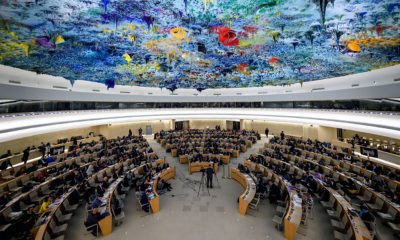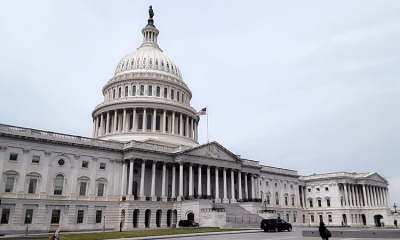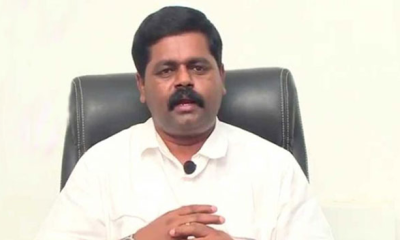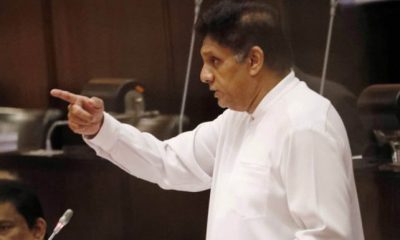Features
Pillayan talks of elections and the East, says Ranil is the best bet for the country
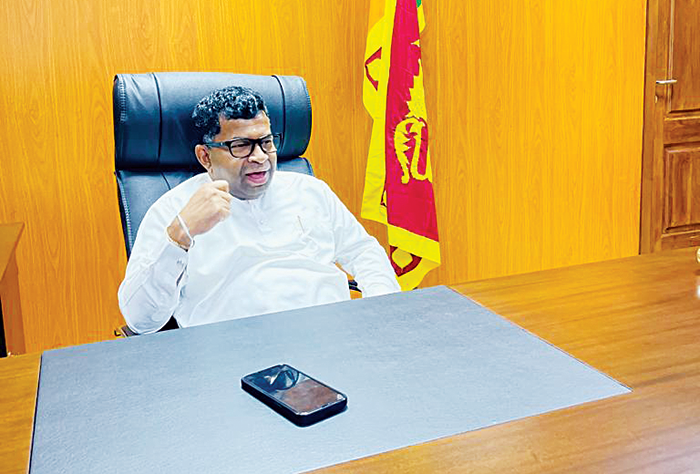
By Saman Indrajith
Forty-eight-year-old Batticaloa District MP Sivanesathurai Chandrakanthan, popularly known as Pillayan, has been shaping the Eastern Province’s political narrative since he was a teenager. He was just 16-years old when he joined the LTTE in 1990 as a child soldier. Since then, he continued to rise in the ranks of the LTTE until his immediate boss, Karuna Amman, decided to leave the outfit with his followers in 2004.
Since then Pillayan has relied on ballots instead of bullets to achieve his political goals. Today, he is the leader of the Tamil Makkal Viduthalai Pulikal (TMVP), which was formed in 2004. He polled the highest number of preferential votes in the Batticaloa District, at the provincial council election for the Eastern Province in 2008 and became the first ever Chief Minister of the province.
“We believe the people in the East have given us a mandate to give up the armed struggle and choose the way of democracy,” he says. Pillayan’s journey from a militant commander to a political leader saw him sport many party colours. Today he is the State Minister of Rural Road Development in the Wickremesinghe – Rajapaksa government.
In a recent interview with the Sunday Island, Pillayan talked about the upcoming elections and asserted that the Eastern Province would vote for a party or alliance led by President Ranil Wickremesinghe as they are convinced of the need to support the latter’s efforts at achieving economic recovery.
Excerpts:
Q: This is an elections year. Given your understanding of the Eastern Province and people there, how would you expect the East to vote in the coming elections?
A:Three days ago, it was announced that the Presidential elections would be held in mid-September this year. There will be parliamentary elections in January next year and the local government elections two months after that in March. This is what has been said about upcoming elections as of now. Having said that, let’s look at the Eastern Province and the way they’ll vote.
We see Tamil, Muslim, and Sinhala voters in the East. Given the situation prevailing in the country, it is sure that the Easterners will vote for anyone who they believe is capable of strengthening the national economy. They understand that the next president should be able to prevail with the IMF and the international community to steer the country out of its present crisis. My party, the TMVP, has not yet decided whom to support, but I am sure that we could deliver the highest number of votes from the Eastern Province. We’ll make the right decision at the right time.
Q: Are you saying that the East is undecided yet?
A: If you speak to people there, you will find that they do not prefer the JVP because, despite their high-volume rhetoric, they are yet to be recognized as leaders capable of governing. People in the East have no belief in them. On the other hand, there is the Opposition Leader’s SJB which has senior politicians, but he too is yet to prove himself as a leader. Eastern people do not see him as a person to whom they should entrust their future. I believe that the incumbent President, Ranil Wickremesinghe, will get the highest number of votes in the Eastern Province in a presidential election.
Q: This has been described as an ‘open season’ for crossovers. Are there any invitations for the TMVP to switch alliances?
A: We contested the last election as a member party of the Pohottuwa alliance. We are yet the governing party of the country. There are internal conflicts and splits within that alliance, which is a common occurrence in any alliance during an election period. A couple of days ago, an SJB MP resigned, citing the reason that he did not want to see his children being cursed by people because of his politics. The media showed some politicians joining the opposition. However, there is yet time for the major players to form alliances. We as a party which can deliver the numbers from the East are observing the developments.
Q: The voters abhor politicians who switch alliances for moneybags. We see in social media people cursing such politicians who betray the aspirations of their people for personal benefit. As a politician who held various positions under several governments, how do you expect this negative public opinion about politicians to influence the upcoming elections?
A: Young voters demand a system change. That was the main demand of the Aragalaya protests too. System change is something that is easier said than done. For example, look at the ongoing Yukthiya operation. If police do not arrest drug traffickers, people blame the police and government. When the arrests are made, they again blame the police and government.
Whatever said on social media, people at the end of the day know that this country needs a strong leadership to take us forward from the present crisis. Those who demand system change expect that there should be an environment for people to live happily in a secure country with a sound economy. For that, security is the number one concern.
Let’s take an example from the past. President Gotabaya Rajapaksa had to leave the presidency. Why was that? There was an economic downfall. The first was the result of the Easter Sunday attacks which had negative impact on tourism industry. There was no foreign exchange and then came the COVID pandemic. President Gotabaya had a plan, but the intervention of other problems did not permit him to implement what he wanted to do. People know that plans and wishful thinking alone won’t help us but there should be decisive action with an understanding of the global developments and the country’s needs as well as its independence and the leaders’ ability to strike a balance.
Q: So it’s your opinion that the incumbent President is the only solution, is it?
A: Yes. There could be hundreds of thousands of facebook posts and social media campaign. But the fact remains that people have sovereignty and they elect their MPs. After that, the leader of the MPs should understand that he must make decisions to protect people. Our primary duty is to the people. The incumbent president knows this responsibility.
What would have happened if there was another crisis after the first? The MPs could not even get on to the roads. The country was sliding fast towards anarchy. Anyone can imagine what will happens when there is mob rule. The Ranil Wickremesighe stood up to the challenge and now here we are where we are. We know that there are price hikes, but we no longer have long queues and lines for essentials, fuel and food. We must respect him for saving this nation from anarchy. I do not think any of our other leaders could do better.
Q: The Eastern Province has the attention of all superpower players in geopolitics. How do you predict the immediate future of the Eastern Province?
A: Eastern Province with its potential and endowments could be the key to development of this country. The superpowers always had an eye on Trincomalee harbor even during the times of the Cold War. When we started politics there were two superpowers – Russia and the US. Now, the superpowers have changed from Russia and the US to different groups. India too is a superpower when it comes to regional politics. The current situation in regional politics is fast changing.
The Islamic State organization has its operations, the Israel conflict is there, Red Sea is fast becoming a war zone, the China-India struggle continues. As you know any of these players would like to get a hold of the Trincomalee harbour which can decisively influence geopolitics. That is why all foreign envoys have their attention on the East. What we need is a leader with a vision to manage all these for the benefit of this country. That is what the East needs as its future.
Q: How does the TMVP prevail in the province?
A: As you know, we are a regional party. We are limited to three districts – Trincomalee, Batticaloa and Amapara. We have many votes in Batticaloa. And you also know that we started our politics after leaving the LTTE. We broke ranks with the LTTE due to internal conflicts and continued to represent the political aspirations of the Eastern Tamil people. Our position is that we cannot divide this country. To live as a united nation, we need to think of power-sharing. This is in line with the power sharing mechanism granted to us in the 13th Amendment to the Constitution.
Now the President too has expressed quite a same opinion. We as a party are happy to live with powers given to us by the 13th amendment. We believe that powers given to the Provincial Councils should be increased at least to the level promised in the Constitution. People in the East are happy with this. We join with governments because when working with governments we can help our people.
After the war, the youth in the East were thinking of leaving this country for good. We pointed out to them that we could work to better our lot and bring about the changes we need. We instilled that confidence in people. They now understand that we were right. I am sure and confident that in the coming elections we can retain our position as the most popular party in the Eastern Province.
Q: You had been a regional commander of the LTTE. You held very high posts of the LTTE was strong and had a big following. Now you have transformed to a different role of a civil leader. If you view this metamorphosis in retrospect, what do you see? What is the present situation of those who followed your orders?
A: Most of those other leaders who had been below me joined politics and others remain. They support the party. They work with us. There are some others who are disabled owing to the injuries they received in the battlefield. Some have lost eyes, others their limbs. I do as much as I can to help them. I help them to gain government support for their livelihood.
It is sad when I see some of them because I can give them anything, but they cannot get back their limbs. I can give them anything and everything but can a person who had lost his eye regain it? Some parents come and ask me whether I know the whereabouts of their son or daughter who had been fighting with us. Have they died in battle? In what way I could assist them to mitigate their losses, I cannot bring them back.
I talk to them and tell them that there had been many other leaders – there was Prabhakaran and then Karuna Amman. Now only I am there. I did not leave them and won’t leave them. Today only I am there to work for them. I continue to serve them and look after their interests.
Q: Is there anything else you want to tell our readers?
A: Criticism is easy. Complaining is easy. Work is hard. This does not mean we should stop working and keep on complaining and blaming the governments for the crisis we are in. There had been other factors beyond anybody’s control such as COVID that contributed to this. We all know where we are. This is the time that we must understand the responsibility of each of us and work hard as a single nation.
Instead, what do we see? You see that when the doctors’ allowances were increased nurses and other health workers started to strike. The government could have easily dealt with that but that would add to the misery. Who suffers because of this strike? Is it the president, the health minister, the MPs or the people who could afford to obtain services of private hospitals? No, it is the poor who are affected badly. I think we must understand this truth and we must each do our duty to get out of this crisis as a single nation. That is the way for system change. There is no other way.
Features
The heart-friendly health minister

by Dr Gotabhya Ranasinghe
Senior Consultant Cardiologist
National Hospital Sri Lanka
When we sought a meeting with Hon Dr. Ramesh Pathirana, Minister of Health, he graciously cleared his busy schedule to accommodate us. Renowned for his attentive listening and deep understanding, Minister Pathirana is dedicated to advancing the health sector. His openness and transparency exemplify the qualities of an exemplary politician and minister.
Dr. Palitha Mahipala, the current Health Secretary, demonstrates both commendable enthusiasm and unwavering support. This combination of attributes makes him a highly compatible colleague for the esteemed Minister of Health.
Our discussion centered on a project that has been in the works for the past 30 years, one that no other minister had managed to advance.
Minister Pathirana, however, recognized the project’s significance and its potential to revolutionize care for heart patients.
The project involves the construction of a state-of-the-art facility at the premises of the National Hospital Colombo. The project’s location within the premises of the National Hospital underscores its importance and relevance to the healthcare infrastructure of the nation.
This facility will include a cardiology building and a tertiary care center, equipped with the latest technology to handle and treat all types of heart-related conditions and surgeries.
Securing funding was a major milestone for this initiative. Minister Pathirana successfully obtained approval for a $40 billion loan from the Asian Development Bank. With the funding in place, the foundation stone is scheduled to be laid in September this year, and construction will begin in January 2025.
This project guarantees a consistent and uninterrupted supply of stents and related medications for heart patients. As a result, patients will have timely access to essential medical supplies during their treatment and recovery. By securing these critical resources, the project aims to enhance patient outcomes, minimize treatment delays, and maintain the highest standards of cardiac care.
Upon its fruition, this monumental building will serve as a beacon of hope and healing, symbolizing the unwavering dedication to improving patient outcomes and fostering a healthier society.We anticipate a future marked by significant progress and positive outcomes in Sri Lanka’s cardiovascular treatment landscape within the foreseeable timeframe.
Features
A LOVING TRIBUTE TO JESUIT FR. ALOYSIUS PIERIS ON HIS 90th BIRTHDAY

by Fr. Emmanuel Fernando, OMI
Jesuit Fr. Aloysius Pieris (affectionately called Fr. Aloy) celebrated his 90th birthday on April 9, 2024 and I, as the editor of our Oblate Journal, THE MISSIONARY OBLATE had gone to press by that time. Immediately I decided to publish an article, appreciating the untiring selfless services he continues to offer for inter-Faith dialogue, the renewal of the Catholic Church, his concern for the poor and the suffering Sri Lankan masses and to me, the present writer.
It was in 1988, when I was appointed Director of the Oblate Scholastics at Ampitiya by the then Oblate Provincial Fr. Anselm Silva, that I came to know Fr. Aloy more closely. Knowing well his expertise in matters spiritual, theological, Indological and pastoral, and with the collaborative spirit of my companion-formators, our Oblate Scholastics were sent to Tulana, the Research and Encounter Centre, Kelaniya, of which he is the Founder-Director, for ‘exposure-programmes’ on matters spiritual, biblical, theological and pastoral. Some of these dimensions according to my view and that of my companion-formators, were not available at the National Seminary, Ampitiya.
Ever since that time, our Oblate formators/ accompaniers at the Oblate Scholasticate, Ampitiya , have continued to send our Oblate Scholastics to Tulana Centre for deepening their insights and convictions regarding matters needed to serve the people in today’s context. Fr. Aloy also had tried very enthusiastically with the Oblate team headed by Frs. Oswald Firth and Clement Waidyasekara to begin a Theologate, directed by the Religious Congregations in Sri Lanka, for the contextual formation/ accompaniment of their members. It should very well be a desired goal of the Leaders / Provincials of the Religious Congregations.
Besides being a formator/accompanier at the Oblate Scholasticate, I was entrusted also with the task of editing and publishing our Oblate journal, ‘The Missionary Oblate’. To maintain the quality of the journal I continue to depend on Fr. Aloy for his thought-provoking and stimulating articles on Biblical Spirituality, Biblical Theology and Ecclesiology. I am very grateful to him for his generous assistance. Of late, his writings on renewal of the Church, initiated by Pope St. John XX111 and continued by Pope Francis through the Synodal path, published in our Oblate journal, enable our readers to focus their attention also on the needed renewal in the Catholic Church in Sri Lanka. Fr. Aloy appreciated very much the Synodal path adopted by the Jesuit Pope Francis for the renewal of the Church, rooted very much on prayerful discernment. In my Religious and presbyteral life, Fr.Aloy continues to be my spiritual animator / guide and ongoing formator / acccompanier.
Fr. Aloysius Pieris, BA Hons (Lond), LPh (SHC, India), STL (PFT, Naples), PhD (SLU/VC), ThD (Tilburg), D.Ltt (KU), has been one of the eminent Asian theologians well recognized internationally and one who has lectured and held visiting chairs in many universities both in the West and in the East. Many members of Religious Congregations from Asian countries have benefited from his lectures and guidance in the East Asian Pastoral Institute (EAPI) in Manila, Philippines. He had been a Theologian consulted by the Federation of Asian Bishops’ Conferences for many years. During his professorship at the Gregorian University in Rome, he was called to be a member of a special group of advisers on other religions consulted by Pope Paul VI.
Fr. Aloy is the author of more than 30 books and well over 500 Research Papers. Some of his books and articles have been translated and published in several countries. Among those books, one can find the following: 1) The Genesis of an Asian Theology of Liberation (An Autobiographical Excursus on the Art of Theologising in Asia, 2) An Asian Theology of Liberation, 3) Providential Timeliness of Vatican 11 (a long-overdue halt to a scandalous millennium, 4) Give Vatican 11 a chance, 5) Leadership in the Church, 6) Relishing our faith in working for justice (Themes for study and discussion), 7) A Message meant mainly, not exclusively for Jesuits (Background information necessary for helping Francis renew the Church), 8) Lent in Lanka (Reflections and Resolutions, 9) Love meets wisdom (A Christian Experience of Buddhism, 10) Fire and Water 11) God’s Reign for God’s poor, 12) Our Unhiddden Agenda (How we Jesuits work, pray and form our men). He is also the Editor of two journals, Vagdevi, Journal of Religious Reflection and Dialogue, New Series.
Fr. Aloy has a BA in Pali and Sanskrit from the University of London and a Ph.D in Buddhist Philosophy from the University of Sri Lankan, Vidyodaya Campus. On Nov. 23, 2019, he was awarded the prestigious honorary Doctorate of Literature (D.Litt) by the Chancellor of the University of Kelaniya, the Most Venerable Welamitiyawe Dharmakirthi Sri Kusala Dhamma Thera.
Fr. Aloy continues to be a promoter of Gospel values and virtues. Justice as a constitutive dimension of love and social concern for the downtrodden masses are very much noted in his life and work. He had very much appreciated the commitment of the late Fr. Joseph (Joe) Fernando, the National Director of the Social and Economic Centre (SEDEC) for the poor.
In Sri Lanka, a few religious Congregations – the Good Shepherd Sisters, the Christian Brothers, the Marist Brothers and the Oblates – have invited him to animate their members especially during their Provincial Congresses, Chapters and International Conferences. The mainline Christian Churches also have sought his advice and followed his seminars. I, for one, regret very much, that the Sri Lankan authorities of the Catholic Church –today’s Hierarchy—- have not sought Fr.
Aloy’s expertise for the renewal of the Catholic Church in Sri Lanka and thus have not benefited from the immense store of wisdom and insight that he can offer to our local Church while the Sri Lankan bishops who governed the Catholic church in the immediate aftermath of the Second Vatican Council (Edmund Fernando OMI, Anthony de Saram, Leo Nanayakkara OSB, Frank Marcus Fernando, Paul Perera,) visited him and consulted him on many matters. Among the Tamil Bishops, Bishop Rayappu Joseph was keeping close contact with him and Bishop J. Deogupillai hosted him and his team visiting him after the horrible Black July massacre of Tamils.
Features
A fairy tale, success or debacle

Sri Lanka-Singapore Free Trade Agreement
By Gomi Senadhira
senadhiragomi@gmail.com
“You might tell fairy tales, but the progress of a country cannot be achieved through such narratives. A country cannot be developed by making false promises. The country moved backward because of the electoral promises made by political parties throughout time. We have witnessed that the ultimate result of this is the country becoming bankrupt. Unfortunately, many segments of the population have not come to realize this yet.” – President Ranil Wickremesinghe, 2024 Budget speech
Any Sri Lankan would agree with the above words of President Wickremesinghe on the false promises our politicians and officials make and the fairy tales they narrate which bankrupted this country. So, to understand this, let’s look at one such fairy tale with lots of false promises; Ranil Wickremesinghe’s greatest achievement in the area of international trade and investment promotion during the Yahapalana period, Sri Lanka-Singapore Free Trade Agreement (SLSFTA).
It is appropriate and timely to do it now as Finance Minister Wickremesinghe has just presented to parliament a bill on the National Policy on Economic Transformation which includes the establishment of an Office for International Trade and the Sri Lanka Institute of Economics and International Trade.
Was SLSFTA a “Cleverly negotiated Free Trade Agreement” as stated by the (former) Minister of Development Strategies and International Trade Malik Samarawickrama during the Parliamentary Debate on the SLSFTA in July 2018, or a colossal blunder covered up with lies, false promises, and fairy tales? After SLSFTA was signed there were a number of fairy tales published on this agreement by the Ministry of Development Strategies and International, Institute of Policy Studies, and others.
However, for this article, I would like to limit my comments to the speech by Minister Samarawickrama during the Parliamentary Debate, and the two most important areas in the agreement which were covered up with lies, fairy tales, and false promises, namely: revenue loss for Sri Lanka and Investment from Singapore. On the other important area, “Waste products dumping” I do not want to comment here as I have written extensively on the issue.
1. The revenue loss
During the Parliamentary Debate in July 2018, Minister Samarawickrama stated “…. let me reiterate that this FTA with Singapore has been very cleverly negotiated by us…. The liberalisation programme under this FTA has been carefully designed to have the least impact on domestic industry and revenue collection. We have included all revenue sensitive items in the negative list of items which will not be subject to removal of tariff. Therefore, 97.8% revenue from Customs duty is protected. Our tariff liberalisation will take place over a period of 12-15 years! In fact, the revenue earned through tariffs on goods imported from Singapore last year was Rs. 35 billion.
The revenue loss for over the next 15 years due to the FTA is only Rs. 733 million– which when annualised, on average, is just Rs. 51 million. That is just 0.14% per year! So anyone who claims the Singapore FTA causes revenue loss to the Government cannot do basic arithmetic! Mr. Speaker, in conclusion, I call on my fellow members of this House – don’t mislead the public with baseless criticism that is not grounded in facts. Don’t look at petty politics and use these issues for your own political survival.”
I was surprised to read the minister’s speech because an article published in January 2018 in “The Straits Times“, based on information released by the Singaporean Negotiators stated, “…. With the FTA, tariff savings for Singapore exports are estimated to hit $10 million annually“.
As the annual tariff savings (that is the revenue loss for Sri Lanka) calculated by the Singaporean Negotiators, Singaporean $ 10 million (Sri Lankan rupees 1,200 million in 2018) was way above the rupees’ 733 million revenue loss for 15 years estimated by the Sri Lankan negotiators, it was clear to any observer that one of the parties to the agreement had not done the basic arithmetic!
Six years later, according to a report published by “The Morning” newspaper, speaking at the Committee on Public Finance (COPF) on 7th May 2024, Mr Samarawickrama’s chief trade negotiator K.J. Weerasinghehad had admitted “…. that forecasted revenue loss for the Government of Sri Lanka through the Singapore FTA is Rs. 450 million in 2023 and Rs. 1.3 billion in 2024.”
If these numbers are correct, as tariff liberalisation under the SLSFTA has just started, we will pass Rs 2 billion very soon. Then, the question is how Sri Lanka’s trade negotiators made such a colossal blunder. Didn’t they do their basic arithmetic? If they didn’t know how to do basic arithmetic they should have at least done their basic readings. For example, the headline of the article published in The Straits Times in January 2018 was “Singapore, Sri Lanka sign FTA, annual savings of $10m expected”.
Anyway, as Sri Lanka’s chief negotiator reiterated at the COPF meeting that “…. since 99% of the tariffs in Singapore have zero rates of duty, Sri Lanka has agreed on 80% tariff liberalisation over a period of 15 years while expecting Singapore investments to address the imbalance in trade,” let’s turn towards investment.
Investment from Singapore
In July 2018, speaking during the Parliamentary Debate on the FTA this is what Minister Malik Samarawickrama stated on investment from Singapore, “Already, thanks to this FTA, in just the past two-and-a-half months since the agreement came into effect we have received a proposal from Singapore for investment amounting to $ 14.8 billion in an oil refinery for export of petroleum products. In addition, we have proposals for a steel manufacturing plant for exports ($ 1 billion investment), flour milling plant ($ 50 million), sugar refinery ($ 200 million). This adds up to more than $ 16.05 billion in the pipeline on these projects alone.
And all of these projects will create thousands of more jobs for our people. In principle approval has already been granted by the BOI and the investors are awaiting the release of land the environmental approvals to commence the project.
I request the Opposition and those with vested interests to change their narrow-minded thinking and join us to develop our country. We must always look at what is best for the whole community, not just the few who may oppose. We owe it to our people to courageously take decisions that will change their lives for the better.”
According to the media report I quoted earlier, speaking at the Committee on Public Finance (COPF) Chief Negotiator Weerasinghe has admitted that Sri Lanka was not happy with overall Singapore investments that have come in the past few years in return for the trade liberalisation under the Singapore-Sri Lanka Free Trade Agreement. He has added that between 2021 and 2023 the total investment from Singapore had been around $162 million!
What happened to those projects worth $16 billion negotiated, thanks to the SLSFTA, in just the two-and-a-half months after the agreement came into effect and approved by the BOI? I do not know about the steel manufacturing plant for exports ($ 1 billion investment), flour milling plant ($ 50 million) and sugar refinery ($ 200 million).
However, story of the multibillion-dollar investment in the Petroleum Refinery unfolded in a manner that would qualify it as the best fairy tale with false promises presented by our politicians and the officials, prior to 2019 elections.
Though many Sri Lankans got to know, through the media which repeatedly highlighted a plethora of issues surrounding the project and the questionable credentials of the Singaporean investor, the construction work on the Mirrijiwela Oil Refinery along with the cement factory began on the24th of March 2019 with a bang and Minister Ranil Wickremesinghe and his ministers along with the foreign and local dignitaries laid the foundation stones.
That was few months before the 2019 Presidential elections. Inaugurating the construction work Prime Minister Ranil Wickremesinghe said the projects will create thousands of job opportunities in the area and surrounding districts.
The oil refinery, which was to be built over 200 acres of land, with the capacity to refine 200,000 barrels of crude oil per day, was to generate US$7 billion of exports and create 1,500 direct and 3,000 indirect jobs. The construction of the refinery was to be completed in 44 months. Four years later, in August 2023 the Cabinet of Ministers approved the proposal presented by President Ranil Wickremesinghe to cancel the agreement with the investors of the refinery as the project has not been implemented! Can they explain to the country how much money was wasted to produce that fairy tale?
It is obvious that the President, ministers, and officials had made huge blunders and had deliberately misled the public and the parliament on the revenue loss and potential investment from SLSFTA with fairy tales and false promises.
As the president himself said, a country cannot be developed by making false promises or with fairy tales and these false promises and fairy tales had bankrupted the country. “Unfortunately, many segments of the population have not come to realize this yet”.
(The writer, a specialist and an activist on trade and development issues . )


